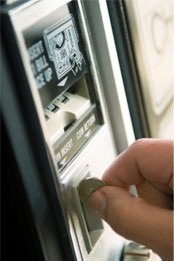The New Way to Conquer Cravings
The latest research says you can actually rewire your brain to keep temptation at bay. Health.com explains how to do it.
Your mouth is watering just thinking about the gooey-sweet glaze, the ribbons of butter and cinnamon. Is it your imagination, or is your heart beating faster?
WILLPOWER, SHMILLPOWER
That's when the bargaining begins: I'll have just a bite and freeze the rest. Or maybe I'll eat half of it—I've been good today—no, all of it, but I'll skip dinner tonight...
Cravings. Research is only just beginning to shed light on why so many of us succumb to them. Although scientists are still piecing together the puzzle of what exactly happens when you're in the throes of a craving, this much they know for sure: Every craving begins with a cue. The cue for a sticky bun may be something as simple as getting a whiff of its buttery aroma as you walk past your favorite bakery, or catching a glimpse of a TV commercial featuring one.
 "Any cue that's repeatedly associated with high-fat and/or sugary foods can trigger a craving," explains Ashley Gearhardt, Ph.D., a psychologist and food addiction expert at the Rudd Center for Food Policy and Obesity at Yale University.
"Any cue that's repeatedly associated with high-fat and/or sugary foods can trigger a craving," explains Ashley Gearhardt, Ph.D., a psychologist and food addiction expert at the Rudd Center for Food Policy and Obesity at Yale University.
The cue activates your brain's pleasure center, causing it to release dopamine, a neurotransmitter that pushes you to seek out the very thing you're lusting after, explains Gearhardt.
What's more, when you're in full-on craving mode, your brain convinces you that you are famished, making the food more difficult to resist. "Your brain starts pumping out the hunger hormone ghrelin, and your insulin levels drop, making you even hungrier than usual," Gearhardt says. As a result, it's very difficult to satisfy the craving with just a taste.
It almost seems unfair that cravings can increase feelings of hunger. It doesn't help that the dopamine signal occurs immediately when you come up against a cue, while the satiety signals—those telling you to stop eating—are much slower, taking 12 or more minutes after you eat to kick in. "Your brain can always find more room for food, and for a while after eating, so can your stomach," adds Dr. Gold.
YOUR BRAIN ON BROWNIES
It's not just that high-fat, sugar-filled and sodium-laden foods are convenient—it's that they're actually engineered to make us crave them. "These foods have an effect on the brain that's much stronger than those produced by foods that you could hunt or grow," Dr. Gold says. "Eating fast food french fries, for instance, yields a greater dopamine release than if you were to eat a tomato picked fresh from your garden."
The complexity of tastes, flavors, and textures in processed foods is simply more stimulating for the brain than something that comes from the earth, he explains. Plus, you get a hit of dopamine each time you try a different flavor—making you crave not just one, but a variety of treats so you'll get that feel-good experience again.
BORN TO LOVE CHIPS
New research suggests that your food preferences—and thus your cravings—may be formed not just in childhood, but in utero. "One theory is that pregnant women begin teaching their children what's safe and good to eat while they're still in the womb," says Annie Murphy Paul, author of Origins: How the Nine Months Before Birth Shape the Rest of Our Lives. So if your mom ate lots of potato chips and cheesy fries, you may be programmed to crave the same kinds of fatty, salty foods.
 What's more, if you equate certain foods with feel-good moments from your childhood, you're likely to turn to them for an emotional pick-me-up. That's because often it's not the foods that we crave as much as the emotions we associate with them.
What's more, if you equate certain foods with feel-good moments from your childhood, you're likely to turn to them for an emotional pick-me-up. That's because often it's not the foods that we crave as much as the emotions we associate with them.
"Pairing foods with particular feelings or situations can imprint an association between an experience and a food," explains Michelle May, M.D., author of Eat What You Love, Love What You Eat. "What you might really want is to feel safe or to remember a time in your life when things were simpler."
MANAGE YOUR MUNCHIES
If you can identify the emotions behind the craving, you can try to find ways to fulfill those needs that are more productive than sinking your teeth into a 500-calorie sugar bomb. "If that seems impossible, then maybe what you really need is a vacation to look forward to in order to make the work more bearable," Dr. May says.
A SMART STRATEGY
No matter the source of your craving (whether it began with an environmental cue or an emotional need) there's another tactic that helps derail the chemical cascade: Focus on your short- and long-term health goals.
In a recent study published in the journal Proceedings of the National Academy of Sciences, researchers examined participants' brains in an MRI scan during a craving and found that paying attention to a goal, such as getting in shape, activates the prefrontal cortex—a part of the brain that can inhibit the reward region.
Here's how to make it work for you: Write down a detailed list of health goals you'd like to achieve. If you're trying to slim down, list your current weight and how much you want to lose. "Being specific is crucial because it offers you more details that help you to say 'no,' " Dr. Gold says.
Also important: Jot down everything you eat throughout the day in a food journal—especially if you're trying to lose weight. Knowing that you'll have to come back to that food journal may reduce your desire to eat it in the first place. "With practice, your ability to resist temptation becomes stronger over time—like a muscle," Gearhardt says. Your prefrontal cortex will kick in more quickly to disrupt the dopamine release and, of course, your craving.
Gold's Gym Mall Ciputra | Gold's Gym Mall of Indonesia | Gold's Gym Thamrin City | Gold's Gym Cilandak Town Square | Gold's Gym Baywalk Mall Pluit | Gold's Gym Kalibata City Mall | Gold's Gym Braga Citywalk | Gold's Gym Cihampelas Walk | Gold's Gym Summarecon Mall Serpong | Gold's Gym Mall @ Alam Sutera | Gold's Gym Bintaro X-change | Gold's Gym The Breeze BSD | Gold's Gym Grand City Surabaya | Gold's Gym Surabaya Town Square | Gold's Gym Grand Metropolitan Bekasi





